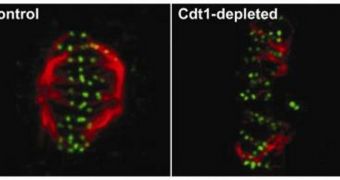The protein Cdt1, which is required for a process known as DNA replication, was recently discovered to play a very important role in mitosis, a critical part of the cellular division cycle. The finding sheds light on why cancers are based on genomic instabilities and unusual numbers of chromosomes.
DNA replication is an extremely complicated and well-coordinated process that takes place at thousands of sites within the human genome, simultaneously. Everything must go according to a natural blueprint, otherwise errors occur.
When this happens, the newly formed cells have either extra or missing material, investigators from the University of North Carolina (UNC) School of Medicine explain. These varied amounts of material are what cause genetic instabilities and birth defects, as well as many forms of cancer.
Usually, the genome is based on 46 DNA-containing chromosomes, but the Cdt1 protein can make mistakes that lead to the development of increased or decreased numbers of chromosomes. This study marks the first time a DNA replication protein has been demonstrated to play this dual role.
“It was such a surprise, because we thought we knew what this protein's job was – to load proteins onto the DNA in preparation for replication,” explains UNC School of Medicine associate Professor of Biochemistry and Biophysics, and Pharmacology, Jean Cook, PhD.
“We had no idea it also had a night job, in a completely separate part of the cell cycle,” adds the expert, who was also the senior author of a new study detailing the findings. The work is published in the latest online issue of the top scientific journal Nature Cell Biology.
Using funds from the US National Institutes of Health (NIH), researchers developed a series of tests meant to determine the proteins Cdt1 interacts with inside cells. Cook found that the molecule influenced not just proteins involved in DNA replication, but also one that played a role in mitosis.
The protein that Cdt1 was found to influence is called Hec1 (highly expressed in cancer-1). Its role is to ensure that the new generation of cells being produced has the correct number of chromosomes, e! Science News reports.
This study may be used to inform new types of research for addressing cancer. Future treatments may be aimed at Cdt1. In fact, the team says, a clinical trial that tries to destroy cancer cells by increasing the amount of Cdt1 they contain is already under way.

 14 DAY TRIAL //
14 DAY TRIAL //